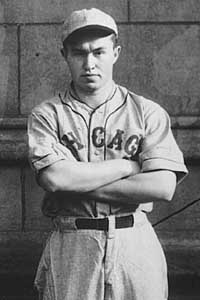New athletics center named after ‘Red’ Ratner, a 1930s Chicago scholar, Maroon baseball player
By Josh SchonwaldNews Office
 Gerald ‘Red’ Ratner |
Red was not a power hitter—he never hit a homer at Chicago—but he was a contact hitter and a speedster; the fastest guy on the team. In fact, at one point during his freshman year, he thought about going out for the track team. The track coach, though, discouraged him, pointing out that Big 10 rival Ohio State had a fellow by the name of Jesse Owens.
Ratner played at Chicago with future big league pitcher Roy Henshaw (who later pitched for the Chicago Cubs), saw the famous “Berwanger 7, Illinois 6” game, when the “Flying Dutchman” Jay Berwanger almost singlehandedly defeated the Illini, and he was in the Bartlett gymnasium locker-room when the legendary Amos Alonzo Stagg, after 40 years at Chicago, said farewell to the just-showered—and half-naked—baseball team. (Stagg’s last words to Ratner, after scanning his then-lean body: “Red– You’re gonna be fat.”)
The biggest moment in Chicago sports history that Red ever witnessed did not even happen on the playing field, but in Hutchinson Commons several years after he graduated from Chicago. He remembers then-President Robert Maynard Hutchins announcing to the Order of the C and some of Chicago’s legendary varsity athletes that the University would leave the Big 10, the conference it helped create.
Like many of the letter-winners, Ratner was initially upset about the Hutchins move. It was a matter of pride. Leaving the Big 10, he said, felt like a demotion. But he also understood Hutchins’ point of view. College sports had changed rapidly during the 1930s. “We were competing against schools recruiting athletes in a way that was indefensible from an academic standpoint,” Ratner recalled.
After all, Ratner did not go to Chicago to play left field. A high school valedictorian who attended Chicago on a $300 scholarship (that was full tuition for a year in those days), Ratner was a straight-A student. He graduated Phi Beta Kappa from the College (Ph.B,’35), and two years later, he graduated “Order of the Coif” from the Law School (J.D.,’37).
Nearly 70 years after he caught his last fly ball for the Maroons, Ratner, an inch shorter and 15 pounds lighter (“Stagg was wrong!” he says) is dressed in a dark business suit, sitting in the Loop office of Gould & Ratner, his law firm where, at 89, he still works every day on his preferred night owl shift, noon to midnight.
He is talking about the role of sports at his alma mater and is telling a story about his office manager’s daughter, a talented soccer player at a high school in Hinsdale, who is interested in attending Chicago. “She goes to campus a few months ago, meets with the coach and tells her she’s interested in playing soccer at Chicago. And you know what the first thing the coach asks her? ‘How are you academically?’” He pauses. “She is, it turns out, a very good student – Then, the coach starts talking about soccer.” He grins broadly.
“The purpose of the College is to educate. Athletics are fun, but they’re incidental, they’re only a supplement to education. Hutchins was right,” Ratner says. “He decided correctly that big-time athletics had nothing to do with the College.”
But Ratner does not agree entirely with the late Hutchins, who famously said: “When I feel the urge to exercise, I just sit down,” and who viewed athletics as a distraction to intellectual life. Unlike Hutchins, Ratner, who still walks daily and lifts weights weekly, believes athletics enhance intellectual performance. “When you’re physically active, you’re stimulated,” says Ratner. “And I think, at least in my experience, that sports stimulated my academic performance.”
Baseball season, Ratner says, was never a problem for him academically. He is not surprised to learn that in recent years Chicago student-athletes have performed equal to or better than their nonathlete peers. He is not surprised that Chicago’s sports teams have graduated three Rhodes scholars in the past eight years. “You just budgeted your time,” says Ratner, “maybe saved the toughest classes for the other season.”
And Ratner says sports—what he calls a “supplement” to the College experience—has been and continues to be a tremendously valuable supplement to his life. His Loop office is packed with memories: the black glove he used as an outfielder, a Louisville Slugger bat from a 1933 game against Wisconsin, autographed baseballs from Chicago teams of the 1990s.
When Ratner talks about his years as a ballplayer—even his time as an intramural touch football player while a law student (“we beat the Medical School, and the Divinity School, and then lost to PSI Upsilon for the school championship”)—he brightens.
After he graduated, Ratner continued his interest in Maroon sports as a fan. He still tries to catch a football game once a year. He attends Order of the C gatherings, and has an annual dinner with Coach Brian Baldea and the baseball team’s graduating seniors. He reads e-mails from the Office of Sports Information and can rattle off statistical information about women’s soccer or recent stars, such as basketball player Derek Reich or quarterback Josh Dunn—just as well as statistics on Jay Berwanger or his other contemporary, the basketball all-American Bill Haarlow.
Of his uncanny memory for sports information, Ratner says, “For some reason, it’s easier to remember the hits than the classroom A’s.”
Asked if there is any single nugget of wisdom that Gerald Ratner, the man, has for students, regarding Gerald Ratner, the new athletics center, he says, with a grin: “Use it. There are so many opportunities to participate, whether club sports, intramural sports, swimming or just working out. Looking back, life would have been a lot less fun without sports.”
![[Chronicle]](/images/sidebar_header_oct06.gif)